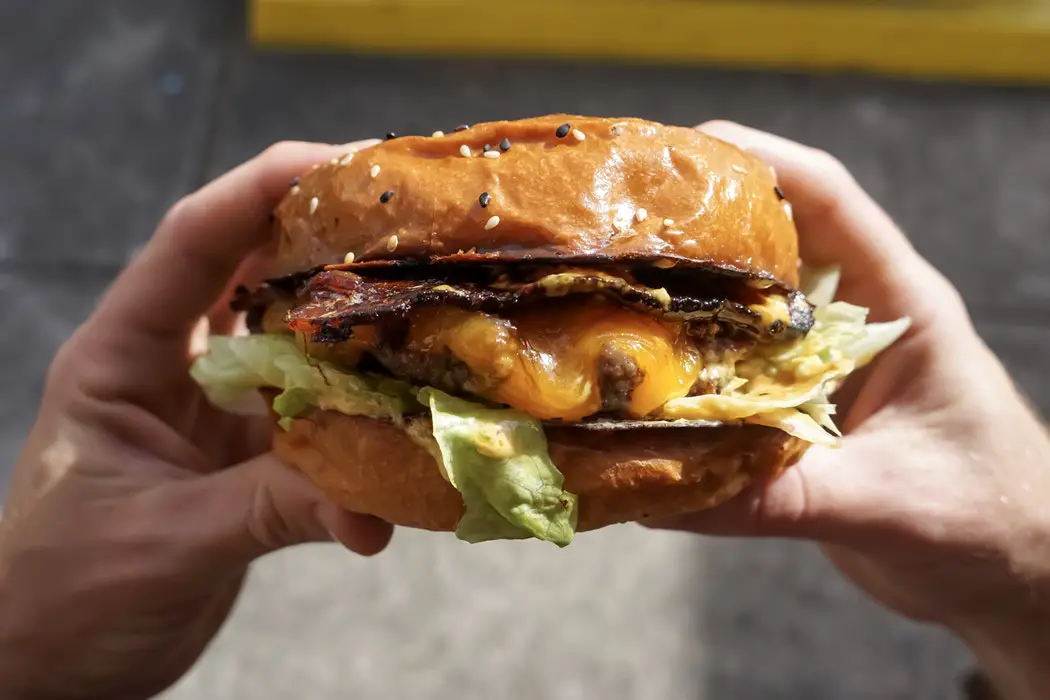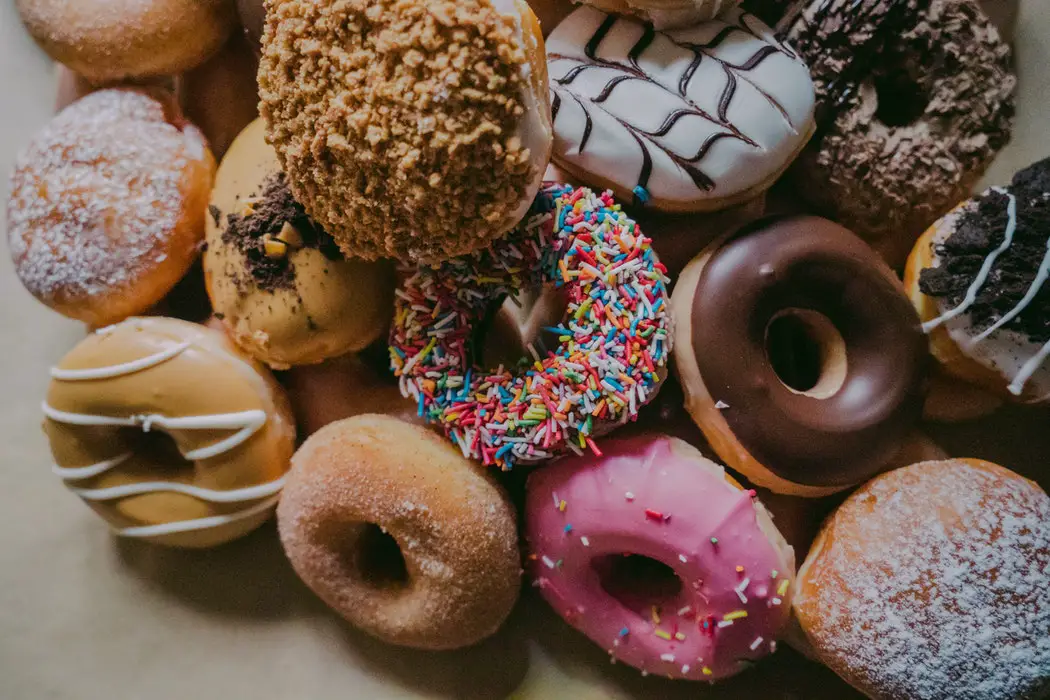![How To Deal With Sensory Overload [9 Tips For Overstimulation]](https://happyrubin.com/wp-content/uploads/2019/12/ik-ben-overprikkeld-150x150.jpg)
Overcoming Emotional Eating: How-To [6 Tips To Stop This Habit Now]
![Overcoming Emotional Eating: How-To [6 Tips To Stop This Habit Now]](https://happyrubin.com/wp-content/uploads/2019/05/emotie-eten-aanpakken.jpg)
What is emotional eating and how can you tackle emotional eating? Here you will find 6 powerful tools to overcome and unlearn emotional eating. Read further…
Contents of this page:
What is Emotional Eating? The meaning
Emotional eating means eating for all sorts of reasons, other than the reason to satisfy your physical hunger.
Emotional eating provides a (temporary!) Feeling of release from discomfort and a temporary feeling of pleasure and satisfaction when you feel something you don’t want to feel.
(Eating too much) has a numbing, soothing effect on our unwanted feelings. It takes our attention away from them. It’s a kind of distraction: you run away from those unpleasant emotions.
Emotional eating can strike at any moment …

It starts with a handful of carrots, skips to a few pieces of cheese, and before you know it, you are sitting with your hands deep in a pint of ice cream. You go to bed exhausted and sick, you feel out of control and you feel like you are sabotaging yourself. Recognizable?
That’s emotional eating, and it happens more often than you think. It is not necessarily the case that you empty your entire refrigerator overnight if you are a victim of emotional eating.
6 powerful tools to overcome and unlearn emotional eating
What are good solutions? How do you overcome and unlearn emotional eating? Below are five tools to put an end to emotional eating for good.
Tip 1: Feel! Don’t let yourself – and your unpleasant emotions – down

The key to ending the emotional eating pattern is not to abandon yourself when you feel unpleasant emotions, but to invite and feel them.
How do you do that? Two extensive articles have been written for this:
- Check out the bit about self-compassion in this article.
- Apply the emotional processing steps in this article.
Tell yourself it’s okay to feel sad, angry, scared, tired, and angry. Welcome your negative emotions with kindness and curiosity, and ask them what they want from you.
Approach your feelings with kindness and your body will begin to understand that it no longer needs to overeat to protect you from your feelings. Plus, by listening to your emotions, you will discover what you really want and can create new strategies for deeper satisfaction.
Tip 2: Satisfy the intent of emotion-eating pleasure in better ways
You eat emotionally to experience pleasure – unfortunately temporarily. There is good news … That intention of pleasure can be satisfied in a number of other ways. Make fun a priority in your life!
- Season water with fruit.
- Wear cheerful, soft, comfortable clothes.
- Take a bubble bath.
- Take care of yourself in other ways.
Tip 3: Or satisfy another basic need in a more meaningful way

In the previous tip, you learned to fulfill the need for pleasure in a more meaningful way than with overeating. However, pleasure is just one possible positive intention behind emotional eating.
Maybe you are emotional eating because of a completely different underlying need, such as connection or protection. For example, Oprah Winfrey has eaten excessively to protect herself from the rapes of her youth.
Tip 4: Don’t go too far in eating less – just eat a lot at the right times
The following fallacy is regularly made around weight loss and diet: if you want to lose weight, you should eat little. This is incorrect unless you are currently well above 2,500 calories per day. And even then you shouldn’t drop (too far) below 2,000 calories per day.
Do not eat too little, otherwise your body will enter a “famine mode”. Check out a top 10 book list of good nutrition tips here.
Tip 5 – Don’t believe in food marketing, believe in your own beauty

Having a background in marketing, I quickly discovered that food companies are constantly striving to make a connection between food and emotion. To create attraction, food marketing promises an emotional benefit beyond the food itself – such as comfort, excitement, excitement, or togetherness.
My job as a marketer was to make this connection even more compelling by reinforcing our collective belief that eating certain foods gives us emotional satisfaction.
The solution? Take back the power of the brands and put that power back in yourself. See your own beauty again. Feel yourself attracted again. You can read how to do that here. And immediately use these tips for self-acceptance.
If all the women suddenly wake up tomorrow and decide they really like their bodies, think twice about how many brands and entire industries would disappear.
Tip 6 – Read books about emotional eating and find guidance if necessary
In addition to the above tips, read some books about emotional eating. Also, counseling with emotional eating is very useful: a dietitian, coach or a doctor are excellent ways to get help.
What is your experience with emotional eating? Or do you perhaps say: emotional eating does not exist! Let me know in the comments.
On your luck!

![5 Best Self Care Tips For College Students [#1 Advice]](https://happyrubin.com/wp-content/uploads/2021/09/the-best-self-care-tips-for-college-students-440x264.jpg)
![How To Stick To New Year’s Resolutions: 9 Tips [Smart & Sure Ways]](https://happyrubin.com/wp-content/uploads/2019/12/tips-voor-goede-voornemens-440x264.jpg)
![How To Stop Being So Hard On Yourself [9 Great Tips]](https://happyrubin.com/wp-content/uploads/2019/12/we-moeten-zoveel-van-onszelf-en-anderen-150x150.jpg)

![19 Best Ice Breaker & Get-To-Know-Eachother Games [Fun & Simple]](https://happyrubin.com/wp-content/uploads/2018/02/leukste-ijsbrekers.jpeg)
![Becoming More Social: 41 Tips [Improving Social Skills] [List]](https://happyrubin.com/wp-content/uploads/2018/06/sociale-vaardigheden1.jpeg)
![How to start a conversation with anyone: 15 tips [Making contact]](https://happyrubin.com/wp-content/uploads/2017/08/gesprekstechnieken1.jpeg)
![372 Friend Tag Q&A Questions [Best Friend Quiz]](https://happyrubin.com/wp-content/uploads/2019/05/best-friend-tag-vragen-voorbeelden.jpg)



![Clingy & controlling behavior of partner/date [Extreme examples]](https://happyrubin.com/wp-content/uploads/2020/06/claimerig-gedrag-van-partner-eigenschappen-en-voorbeelden-150x150.jpg)

![How to recognize if a man is in love [Signals & his body language]](https://happyrubin.com/wp-content/uploads/2020/05/verliefd-gedrag-van-mannen-herkennen-150x150.jpg)


![Free will and religion / theology [Verses & Quotes on free will]](https://happyrubin.com/wp-content/uploads/2020/10/religion-on-free-will-quotes-1050x640-1-150x150.jpg)

![Dealing With Setbacks & Hardship [Lessons & Examples]](https://happyrubin.com/wp-content/uploads/2018/11/omgaan-met-tegenslag-tips-hoe-dan.jpeg)
![NLP Agreement Frame: Use these exact sentences [Examples]](https://happyrubin.com/wp-content/uploads/2020/10/agreement-frame-nlp-1125x640-1-440x264.jpeg)
![122 Best Comebacks In Any Situation [Best Examples]](https://happyrubin.com/wp-content/uploads/2020/06/beste-comebacks-technieken-tips-440x264.jpg)
![Using Hypnosis to Stop Smoking [HowTo]](https://happyrubin.com/wp-content/uploads/2020/05/stoppen-met-roken-door-hypnose-150x150.jpg)
![Presuppositions language pattern: meaning & examples [NLP]](https://happyrubin.com/wp-content/uploads/2020/04/wat-zijn-vooronderstellingen-150x150.jpg)
![Peripheral Vision: Meaning & Exercise [Essential Skill]](https://happyrubin.com/wp-content/uploads/2020/04/perifeer-zicht-trainen-tips-150x150.jpg)

![How To Start A Coaching Business [21 Smart Tips]](https://happyrubin.com/wp-content/uploads/2018/11/coachingpraktijk-starten-tips.jpeg)
![How to make dreams come true? [33 tips to realize dreams 100%]](https://happyrubin.com/wp-content/uploads/2018/05/dromen-mijlpalen.jpeg)
![How To Become Rich? 27 Millionaire Tips [Guaranteed To Work]](https://happyrubin.com/wp-content/uploads/2018/01/hoe-kan-ik-rijk-worden.jpeg)
![77 Best Online Marketing Tools [Recommendations] [Also Free]](https://happyrubin.com/wp-content/uploads/2018/08/beste-onlne-marketing-tools-tips.jpeg)
![Complete List Of Virtues & Qualities [Including Explanation]](https://happyrubin.com/wp-content/uploads/2018/12/kernkwaliteiten-uitleg.jpeg)
![Being Attentive: How Do You Do That? [Meaning & 9 Tips]](https://happyrubin.com/wp-content/uploads/2019/05/attent-zijn.jpg)
![Being Conscientious: Meaning Of This Virtue [Explained]](https://happyrubin.com/wp-content/uploads/2018/07/Consciëntieus-persoon.jpg)


![Best Books About Burn-Out [Top 10] [Update 2024]](https://happyrubin.com/wp-content/uploads/2020/06/beste-boeken-over-burnout-lijst-440x264.jpg)
![Best Self-love Books [Top 10] [Update 2024]](https://happyrubin.com/wp-content/uploads/2020/04/beste-boeken-over-zelfliefde-aanraders-440x264.jpg)
![Life changing books: 10 books that change your life [2024 Update]](https://happyrubin.com/wp-content/uploads/2020/03/levensveranderende-boeken-tips-150x150.jpg)
![Top 10 Best Books: Recommendations Per Genre [2024 Update]](https://happyrubin.com/wp-content/uploads/2019/12/best-books-per-genre-150x150.png)
![Best Books On procrastination: Must Reads [List] [2024 Update]](https://happyrubin.com/wp-content/uploads/2019/11/beste-boeken-over-uitstelgedrag-tips-150x150.jpg)
![Joe Dispenza: Events To Attend [2024 & 2025] [All Info]](https://happyrubin.com/wp-content/uploads/2020/02/joe-dispenxa-events-440x264.png)
![Best Online Study Options [Online Education Top List]](https://happyrubin.com/wp-content/uploads/2019/03/best-home-study-options-440x264.png)
![Teachable Review & Experiences 2024 [Bad Online Training Tool?]](https://happyrubin.com/wp-content/uploads/2020/02/Teachable-review-ervaringen-150x150.png)
![Audible Review, Experiences & Special Discount [Scam?]](https://happyrubin.com/wp-content/uploads/2020/01/audible-review-ervaringen-150x150.png)
![Guest Posts Wanted [Free & Always Directly Accepted]](https://happyrubin.com/wp-content/uploads/2019/05/gastbloggen-regels.jpg)

